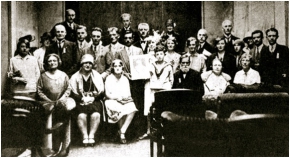Section of the Baha'i Esperanto Conference, part of the Twentieth Universal Congress of Esperanto, in Antwerp, Belgium, taken just before the first session. In the front row seated, Miss Lydja Zamenhof in white, who served as honorary President of the Conference, and representatives from England, Persia, Germany, Holland, United States and other countries.

1932: The Esperantists of Tomakomai, Hokkaido, Japan, welcome Agnes Alexander
Photograph taken at the welcome meeting by the Esperantists of Tomakomai, Hokkaido, Japan to Miss Agnes Alexander, August 3, 1922. Front row, from left, is Tadashi Watanabe, the promoter of the meeting, and third from left is the Mayor. (Star of the West, November 1932, vol. 23, no. 8)
J.E. Esselmont's book Bahá'u'lláh and the New Era quotes 'Abdu’l-Bahá in the chapter entitled Universal Language:
At an Esperanto banquet given in Paris in February 1913, 'Abdu’l-Bahá said:—
Today one of the chief causes of the differences in Europe is the diversity of languages. We say this man is a German, the other is an Italian, then we meet an Englishman and then again a Frenchman. Although they belong to the same race, yet language is the greatest barrier between them. Were a universal auxiliary language in operation they would all be considered as one.
His Holiness Bahá’u’lláh wrote about this international language more than forty years ago. He says that as long as an international language is not adopted, complete union between the various sections of the world will be unrealized, for we observe that misunderstandings keep people from mutual association, and these misunderstandings will not be dispelled except through an international auxiliary language.
Generally speaking, the whole people of the Orient are not fully informed of events in the West, neither can the Westerners put themselves in sympathetic touch with the Easterners; their thoughts are enclosed in a casket—the international language will be the master key to open it. Were we in possession of a universal language, the Western books could easily be translated into that language, and the Eastern peoples be informed of their contents. In the same way the books of the East could be translated into that language for the benefit of the people in the West. The greatest means of progress towards the union of East and West will be a common language. It will make the whole world one home and become the strongest impulse for human advancement. It will upraise the standard of the oneness of humanity. It will make the earth one universal commonwealth. It will be the cause of love between the children of men. It will cause good fellowship between the various races.
Now, praise be to God that Dr. Zamenhof has invented the Esperanto language. It has all the potential qualities of becoming the international means of communication. All of us must be grateful and thankful to him for this noble effort; for in this way he has served his fellowmen well. With untiring effort and self-sacrifice on the part of its devotees Esperanto will become universal. Therefore every one of us must study this language and spread it as far as possible so that day by day it may receive a broader recognition, be accepted by all nations and governments of the world, and become a part of the curriculum in all the public schools. I hope that Esperanto will be adopted as the language of all the future international conferences and congresses, so that all people need acquire only two languages—one their own tongue and the other the international language. Then perfect union will be established between all the people of the world. Consider how difficult it is today to communicate with various nations. If one studies fifty languages one may yet travel through a country and not know the language. Therefore I hope that you will make the utmost effort, so that this language of Esperanto may be widely spread.
In the past, Bahá'ís were more active in learning and encouraging the learning of Esperanto, and the links between Esperanto and the Bahá'í Faith are numerous.Ehsan Yarshater, the ex-Bahá'í founder and editor of Encyclopedia Iranica, notes how as a child in Iran he learned and taught Esperanto and that when his mother was visiting Haifa he wrote her a letter in Persian as well as Esperanto. L.L. Zamenhof's daughter, Lidia Zamenhof was a convert to the Bahá'í Faith.
Due to the failure of Esperanto to gain significant traction, however, 'Abdu’l-Bahá's statements have been backtracked, such that Shoghi Effendi said
Regarding the subject of Esperanto; it should be made clear to the believers that while the teaching of that language has been repeatedly encouraged by 'Abdu’l-Bahá, there is no reference either from Him or from Bahá’u’lláh that can make us believe that it will necessarily develop into the international auxiliary language of the future.Bahá’u’lláh has specified in His Writings that such a language will either have to be chosen from one of the existing languages, or an entirely new one should be created to serve as a medium of exchange between the nations and peoples of the world. Pending this final choice, the Bahá’ís are advised to study Esperanto only in consideration of the fact that the learning of this language can considerably facilitate intercommunication between individuals, groups and Assemblies throughout the Bahá’í world in the present stage of the evolution of the Faith.
 English (UK)
English (UK)
 فارسی
فارسی 



